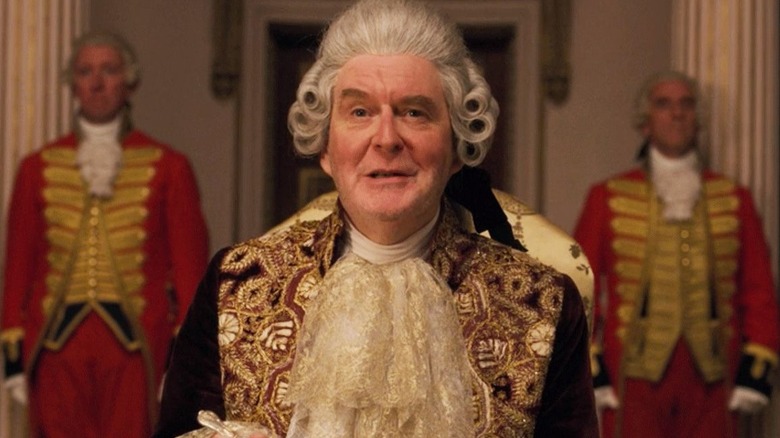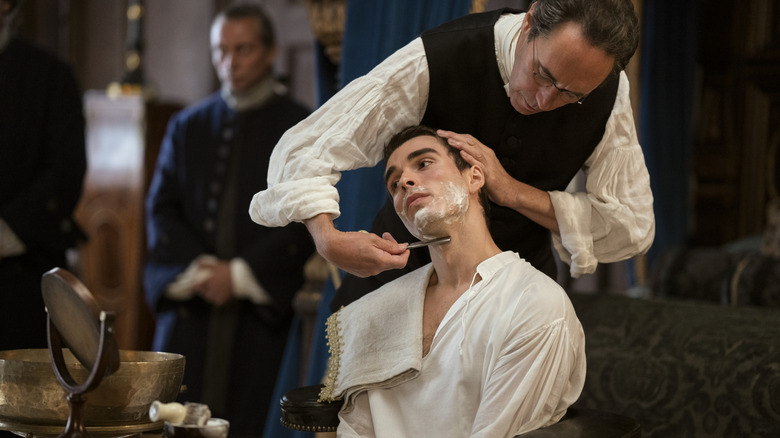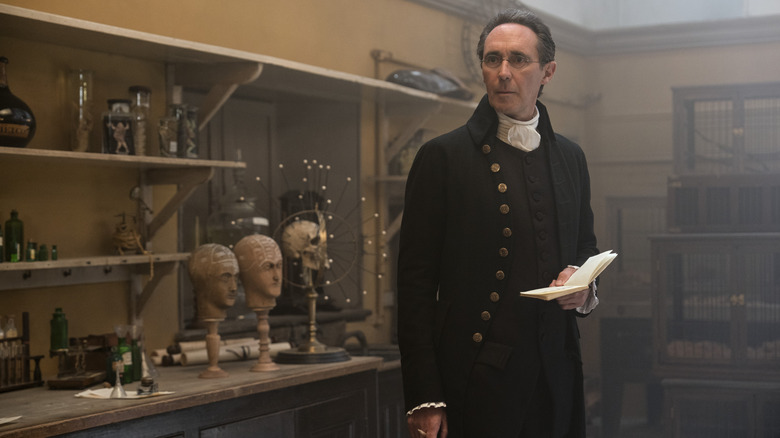Because the starting of Season 1, “Bridgerton” has had a fairly laissez-faire relationship with historical past. At occasions, it pulls fairly immediately from the true Regency period, whereas at others it creates its personal absolutely distinct alternate historical past. Due to the present’s lush type and romance style aesthetic, this steadiness works fairly effectively. Nevertheless, there’s one space the place the collection takes specific inspiration from actual English historical past — specifically, with the character of King George III.
In the main “Bridgerton” series, George (performed by James Fleet) is far more of a background character due largely to the mysterious sickness that retains him in mattress and off-camera for almost all of the time. Since Queen Charlotte (Golda Rosheuvel) is simply a supporting character on the present, we solely get snippets right here and there of their tragic love story. What’s clear is that George is severely unwell, leaving his spouse to rule virtually solely in his stead.
The prequel miniseries “Queen Charlotte: A Bridgerton Story” put Charlotte (now performed by India Amarteifio) and George (Corey Mylchreest) within the highlight, revealing many extra particulars about each their relationship and George’s psychological well being struggles. To be clear, there is not something “mistaken” with George right here. He appears to have one or a few psychological well being situations, which viewers have advised may very well be a variation of bipolar dysfunction. In “Queen Charlotte,” his situation is arguably made far worse by the barbaric medical practices administered to “treatment” him. When he is a lot older in “Bridgerton,” George’s signs are extra doubtless reflective of dementia. However how correct are these portrayals to the true King George?
How King George III was handled in actual life
In “Bridgerton,” King George sometimes stays in his personal chambers and out of sight of the general public, though he does dine sometimes with Queen Charlotte when he is feeling effectively sufficient to take action. The “Queen Charlotte” prequel collection exhibits a a lot youthful George fighting an early model of comparable points, however the true historical past does not connect such diagnoses to the king till a lot later in his life. It was within the early 1800s, when “Bridgerton” takes place, that constant well being points pressured George to primarily retire from his position as monarch. He was deemed unfit to rule and formally changed by his son in 1811.
“Queen Charlotte” depicts George as a younger man obsessive about science and the celebrities however tormented by psychological struggles. Nevertheless, the true King Geroge III was doubtless extra involved with political points just like the American Revolution. Whereas his repute as a “mad king” is overblown given the fashionable perspective on his doubtless psychological situations, his picture as a tyrant each at residence and overseas is not solely unfounded.
The actual King George suffered from comparable situations to his Bridgerton counterpart
Because of the medical know-how of the time and the secrecy across the royal household, it is inconceivable to say for sure what potential medical situations the true King George III might have handled. That mentioned, trendy theories match up fairly effectively to his depiction on “Bridgerton.” A 2015 study performed by the College of Birmingham’s Timothy Peters using “methods of cognitive archeology” decided the identical two situations beforehand talked about. Per the examine, “The outcomes of this evaluation affirm that the king suffered from bipolar dysfunction kind I, with a closing decade of dementia, due, partly, to the neurotoxicity of his recurrent episodes of acute mania.”
In different phrases, George’s portrayal in the “Bridgerton” shows, whereas clearly extremely dramatized, is definitely fairly correct to what specialists at the moment consider was truly the case. In each the present and in his day in the true world, George was written off as affected by some type of “insanity,” reflecting the leaps and bounds we have made in how we take a look at and speak about psychological sickness within the modern-day.
Did Queen Charlotte’s merciless medical therapies on King George actually occur?
As beforehand talked about, the true King George III did not have main psychological well being crises (that we all know of) till a lot later in his life than what’s depicted within the “Bridgerton” universe. That mentioned, his retreats to Kew Palace, as depicted in “Queen Charlotte,” did happen in actual life when was unwell. These journeys merely happened afterward in his precise life.
As for the merciless and brutal medical therapies that George is subjected to in “Queen Charlotte,” they are not far off from what the true king went via as soon as his “insanity” started to take maintain. When the King started to expertise episodes, he was put via a spread of procedures we now know to be utterly absurd and even dangerous. In line with Sky History, “These included making use of arsenic-laden powders to the king’s pores and skin to make it burn and blister, ravenous him and plunging him into freezing chilly water. The king was additionally given emetics to make him vomit and purgatives to present him diarrhoea [sic].” Physician John Monro, performed villainously by Man Henry on “Queen Charlotte,” was additionally an actual individual and a “mad physician,” as his discipline was referred to on the time. Nevertheless, he didn’t work immediately with King George and had, in reality, handed away years earlier than the king’s “insanity” set in.
Straitjackets and gags had been additionally used at occasions to “restrain” the king. Whereas we’ll by no means know the precise nature of his situation, it is protected to say that George would have been higher off with a a lot much less violent routine and a greater understanding of psychological well being. Nonetheless, because the King of England, it is attainable that some proportion of his extra aggressive episodes had extra to do together with his relationship to energy than his underlying medical situations.
“Bridgerton” and “Queen Charlotte: A Bridgerton Story” are streaming on Netflix.
Because the starting of Season 1, “Bridgerton” has had a fairly laissez-faire relationship with historical past. At occasions, it pulls fairly immediately from the true Regency period, whereas at others it creates its personal absolutely distinct alternate historical past. Due to the present’s lush type and romance style aesthetic, this steadiness works fairly effectively. Nevertheless, there’s one space the place the collection takes specific inspiration from actual English historical past — specifically, with the character of King George III.
In the main “Bridgerton” series, George (performed by James Fleet) is far more of a background character due largely to the mysterious sickness that retains him in mattress and off-camera for almost all of the time. Since Queen Charlotte (Golda Rosheuvel) is simply a supporting character on the present, we solely get snippets right here and there of their tragic love story. What’s clear is that George is severely unwell, leaving his spouse to rule virtually solely in his stead.
The prequel miniseries “Queen Charlotte: A Bridgerton Story” put Charlotte (now performed by India Amarteifio) and George (Corey Mylchreest) within the highlight, revealing many extra particulars about each their relationship and George’s psychological well being struggles. To be clear, there is not something “mistaken” with George right here. He appears to have one or a few psychological well being situations, which viewers have advised may very well be a variation of bipolar dysfunction. In “Queen Charlotte,” his situation is arguably made far worse by the barbaric medical practices administered to “treatment” him. When he is a lot older in “Bridgerton,” George’s signs are extra doubtless reflective of dementia. However how correct are these portrayals to the true King George?
How King George III was handled in actual life
In “Bridgerton,” King George sometimes stays in his personal chambers and out of sight of the general public, though he does dine sometimes with Queen Charlotte when he is feeling effectively sufficient to take action. The “Queen Charlotte” prequel collection exhibits a a lot youthful George fighting an early model of comparable points, however the true historical past does not connect such diagnoses to the king till a lot later in his life. It was within the early 1800s, when “Bridgerton” takes place, that constant well being points pressured George to primarily retire from his position as monarch. He was deemed unfit to rule and formally changed by his son in 1811.
“Queen Charlotte” depicts George as a younger man obsessive about science and the celebrities however tormented by psychological struggles. Nevertheless, the true King Geroge III was doubtless extra involved with political points just like the American Revolution. Whereas his repute as a “mad king” is overblown given the fashionable perspective on his doubtless psychological situations, his picture as a tyrant each at residence and overseas is not solely unfounded.
The actual King George suffered from comparable situations to his Bridgerton counterpart
Because of the medical know-how of the time and the secrecy across the royal household, it is inconceivable to say for sure what potential medical situations the true King George III might have handled. That mentioned, trendy theories match up fairly effectively to his depiction on “Bridgerton.” A 2015 study performed by the College of Birmingham’s Timothy Peters using “methods of cognitive archeology” decided the identical two situations beforehand talked about. Per the examine, “The outcomes of this evaluation affirm that the king suffered from bipolar dysfunction kind I, with a closing decade of dementia, due, partly, to the neurotoxicity of his recurrent episodes of acute mania.”
In different phrases, George’s portrayal in the “Bridgerton” shows, whereas clearly extremely dramatized, is definitely fairly correct to what specialists at the moment consider was truly the case. In each the present and in his day in the true world, George was written off as affected by some type of “insanity,” reflecting the leaps and bounds we have made in how we take a look at and speak about psychological sickness within the modern-day.
Did Queen Charlotte’s merciless medical therapies on King George actually occur?
As beforehand talked about, the true King George III did not have main psychological well being crises (that we all know of) till a lot later in his life than what’s depicted within the “Bridgerton” universe. That mentioned, his retreats to Kew Palace, as depicted in “Queen Charlotte,” did happen in actual life when was unwell. These journeys merely happened afterward in his precise life.
As for the merciless and brutal medical therapies that George is subjected to in “Queen Charlotte,” they are not far off from what the true king went via as soon as his “insanity” started to take maintain. When the King started to expertise episodes, he was put via a spread of procedures we now know to be utterly absurd and even dangerous. In line with Sky History, “These included making use of arsenic-laden powders to the king’s pores and skin to make it burn and blister, ravenous him and plunging him into freezing chilly water. The king was additionally given emetics to make him vomit and purgatives to present him diarrhoea [sic].” Physician John Monro, performed villainously by Man Henry on “Queen Charlotte,” was additionally an actual individual and a “mad physician,” as his discipline was referred to on the time. Nevertheless, he didn’t work immediately with King George and had, in reality, handed away years earlier than the king’s “insanity” set in.
Straitjackets and gags had been additionally used at occasions to “restrain” the king. Whereas we’ll by no means know the precise nature of his situation, it is protected to say that George would have been higher off with a a lot much less violent routine and a greater understanding of psychological well being. Nonetheless, because the King of England, it is attainable that some proportion of his extra aggressive episodes had extra to do together with his relationship to energy than his underlying medical situations.
“Bridgerton” and “Queen Charlotte: A Bridgerton Story” are streaming on Netflix.























